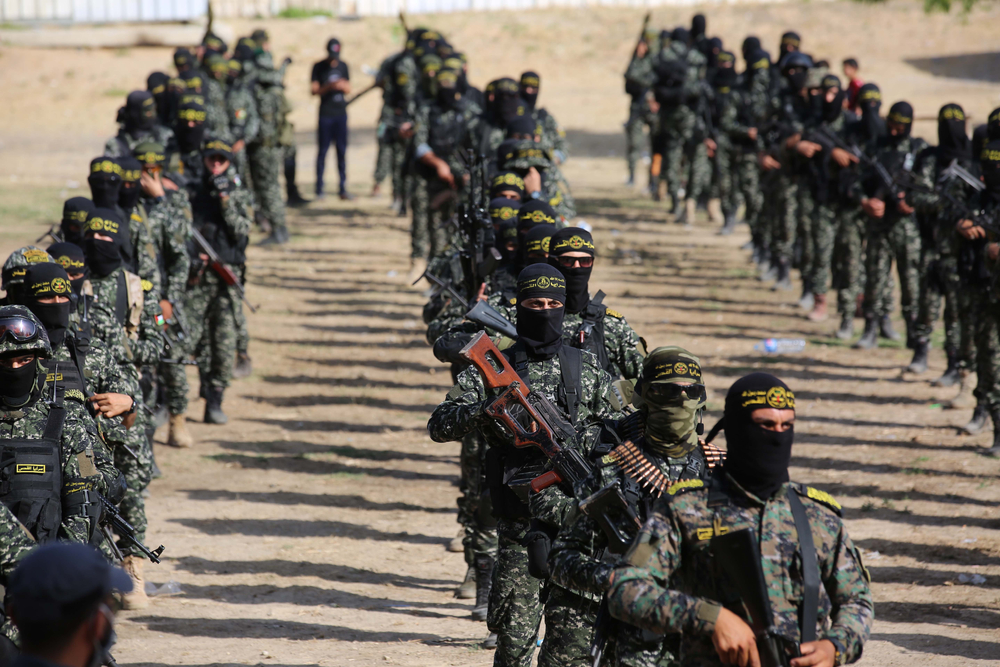FRESH AIR
Palestinian Islamic Jihad and the shell game in Gaza
May 12, 2023 | Oved Lobel

Israel is now in the midst of its third operation against Palestinian Islamic Jihad (PIJ) since 2019, and, thus far, Hamas has once again failed to join in PIJ’s retaliatory rocket fire. How does one square Israel’s sporadic, isolated attacks on PIJ with Jerusalem’s general and correct assertion that Hamas is responsible for all rocket fire from Gaza, over which Hamas has absolute control? Why does Israel bombard Hamas facilities whenever rockets are launched from Gaza except when the IDF initiates operations against PIJ’s commanders?
In the first place, one fundamental difference between these three anti-PIJ operations and the usual joint Palestinian attacks is that Israel initiated the action and chose the timing. When Hamas initiates a round of violence, as it did a month ago and as it does during larger wars, it is happy to launch scores of rockets at Israel from wherever it can alongside other groups like PIJ. But why does Hamas not then join PIJ in its retaliatory rocket launches when Israel mounts operations targeting PIJ commanders?
To understand this delicate dance, one must understand two things. First, Israel, like every country, is chiefly concerned with managing security risks below escalation thresholds and otherwise seeks to maintain the status quo. Second, the situation in Gaza is merely a microcosm of a broader shell game being conducted by Iran and its Islamic Revolutionary Guard Corps (IRGC).
PIJ was formed in the early 1980s as committed devotees of the Iranian regime founded by Ayatollah Ruhollah Khomeini, while Hamas began its existence as an organ of the Sunni Islamist Muslim Brotherhood. Yet while PIJ was ideologically beholden to Iran’s Supreme Leader from the very start, Hamas has also long since been absorbed into the IRGC’s broader command structure. While less devoted to Iranian state ideology, it has become so materially dependent on Iran that its original Muslim Brotherhood origins are of little relevance.
In Gaza, PIJ performs the same function for Hamas that Hamas now performs for Hezbollah in Lebanon and that Hezbollah and its sister proxy groups in Iraq, Syria and Yemen perform for the IRGC in Iran. Thus, when PIJ fires rockets from Gaza, Hamas is not targeted. When Hamas fires rockets from Lebanon, Hezbollah is not targeted. And when Hezbollah fires rockets from Lebanon – or the Houthis from Yemen or the Iraqi or Syrian IRGC fronts from their respective locations – Iran is not targeted. In reality, it is all part of the same IRGC command network, but all sides are saved from larger escalation by pretending otherwise.
Israel, like other countries, has no interest in direct escalation with Iran in the near term, and so occasionally acts as if there’s a relevant distinction between these various IRGC elements, just as the UAE and Saudi Arabia pretend the Houthis in Yemen are not simply an IRGC alias and the US strikes Iraqi and Syrian IRGC front groups on occasion, but never hits Iran itself. Despite this operational pretence, all of these countries know better, and have occasionally admitted as much. For its part, Iran also wishes to avoid direct war on its territory, which is one of the primary reasons for playing the shell game with its adversaries in the first place by maintaining the fiction that its fully-controlled proxies act independently.
Israel is not currently interested in deposing or even destabilising Hamas in Gaza, given the costs of doing so and likelihood of chaos and violence if the group’s rule were to collapse. Thus, Jerusalem helps keep the Hamas regime afloat, permitting Qatar to subsidise it to the tune of approximately US$360 million annually and allowing thousands of workers into Israel from Gaza, even though it knows Hamas will collect taxes on much of their wages.
There are so many conflicts between Palestinian groups in Hamas-controlled Gaza and Israel because the latter’s policy is focussed on containing and managing them rather than changing the Hamas-run status quo, the results of which would be unpredictable and potentially very risky.
Targeting PIJ’s leadership and rocket arsenals every few years is the epitome of this policy of conflict management; after all, if there were any decisive outcomes to these anti-PIJ operations, Israel would not be launching its third in four years. PIJ knows this, Hamas knows this, Israel knows this and Iran knows this.
PIJ does not actually have operational independence from Hamas in Gaza, as Israel well knows and often says except during the operations against the group such as Black Belt in 2019, Breaking Dawn in 2022 and now Shield and Arrow. But this great game of pretend serves all sides by allowing them to limit the conflict for the time being.
RELATED ARTICLES

US Middle East strategy amid regional instability: Dana Stroul at the Sydney Institute

Antisemitism in Australia after the Bondi Massacre: Arsen Ostrovsky at the Sydney Institute





















